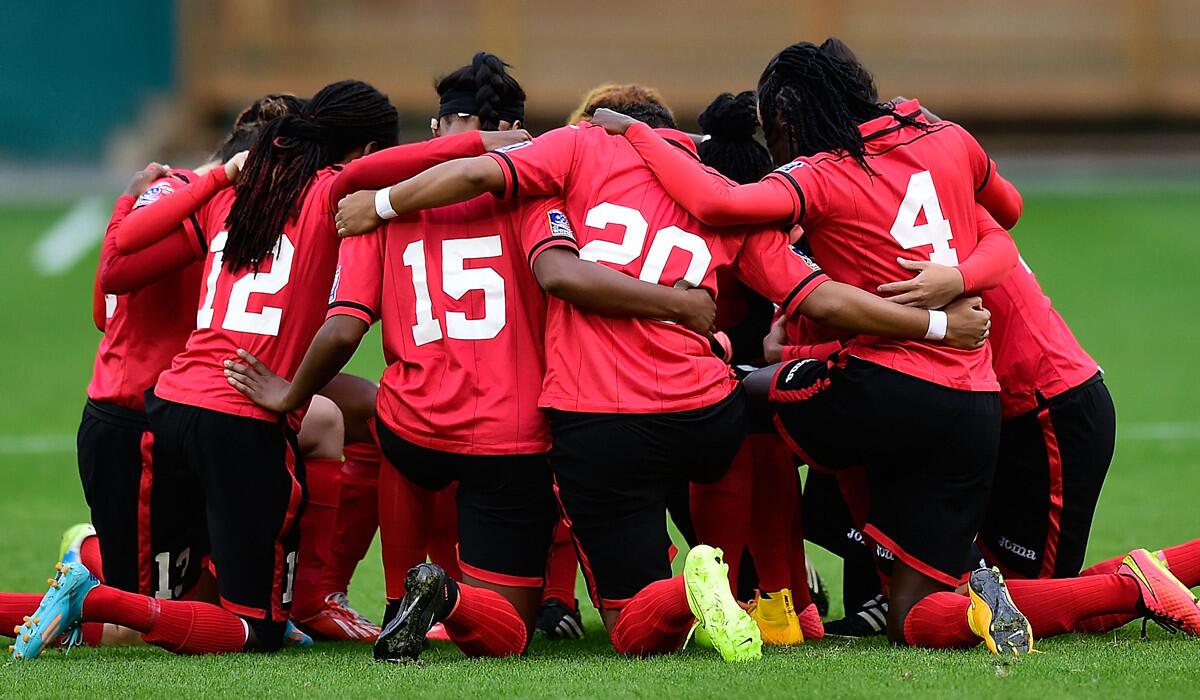Trinidad and Tobago women’s World Cup team goes from rags to riches

The first clue Randy Waldrum had that something might be wrong with his soccer team came in a pre-dawn phone call from the Dallas airport.
The Trinidad and Tobago women’s team had flown in to play the top-ranked U.S. in their first World Cup qualifying match. But 13 of Waldrum’s players were stranded at a taxi stand without enough money for a ride to their hotel.
The players had left the island a day earlier without so much as a deflated soccer ball among them. At least one woman didn’t even have a pair of cleats. And after buying dinner during a stopover at the Miami airport, the team was down to $15 a player.
So Waldrum did what any tech-savvy soccer coach would do — he tweeted out a plea for help. “I really just expected it to reach some people in the area that would help me get through a day or two,” he said.
Instead, donations poured in from as far away as Singapore and Poland. Restaurants offered free meals, while local soccer fans contributed water, Gatorade, protein bars and practice uniforms. By late that afternoon, Waldrum had gathered nearly $10,000 in an account that would eventually top $16,000 – including $658 the equally strapped Haitian team raised through bake sales and barbecues.
“I never knew this thing would go viral like it did,” Waldrum said. “It touched so many people. It was incredible.”
Even more incredible, though, is what happened next.
After holding the U.S. to a goal in a 1-0 loss in the qualifying opener, narrow victories over Haiti and Guatemala have sent Trinidad and Tobago on to Friday’s tournament semifinals outside Philadelphia, where a win over Costa Rica will make it the first Caribbean team in history to reach the Women’s World Cup. (Cuba, Haiti, Jamaica and Trinidad and Tobago have all represented the Caribbean in the men’s tournament, with Trinidad qualifying in 2006.)
But a loss Friday won’t end the women’s Cinderella run, since the team could also advance to next summer’s World Cup with a win in Sunday’s third-place game or a victory over Ecuador in a two-leg playoff next month.
“We’ve got a wonderful opportunity to qualify,” said Waldrum, whose team was ranked 125th in the world six weeks ago. “I like our team and I like our chances.”
The coach believes the help his players received over the last two weeks has had a lot to do with their success.
“The outpouring of support from people who don’t really even know us, it’s been amazing,” he said by phone as his team bussed from Washington D.C. to Chester, Pa., for Friday’s game. “The help that we got, I think that’s tied into this run. It has strengthened them to realize that there’s many people out there rooting for them.”
Although Trinidad and Tobago is one of the wealthiest, most-developed countries in the Caribbean, a number of scandals has left its soccer federation heavily in debt. As a result, the team’s trip to the U.S. was delayed three days while the federation searched for enough money to pay for the necessary visas.
And the 13 players, few of whom have ever received anything more than a modest stipend, were handed just $500 by the Trinidad federation to split among themselves during the 18-day qualifying tournament in the U.S.
Even Waldrum, an American who coached Notre Dame’s women’s teams to two NCAA titles before taking over the expansion Houston Dash of the National Women’s Soccer League, is working for free.
“This group of ladies has sacrificed so much,” said Waldrum, who coaches alongside his son Ben. “A lot of these kids don’t know where all their meals every day are going to come from. They come from difficult backgrounds.
“We just realized we could sacrifice a little bit based on what they’re sacrificing for it.”
In women’s soccer, sacrifice isn’t limited to Trinidad and Tobago, though. The massive salaries and rich sponsorship deals that mark the men’s sport don’t exist in the women’s game outside the U.S., where national team players Alex Morgan, Christie Rampone and Becky Sauerbrunn each earned more than $270,000 – not counting endorsements -- last year.
Cuba’s women, for example, relied heavily on donations to make it through the Olympic qualifying tournament in 2011 while Haiti had as many as nine players living in a single apartment, paying their bills through fundraisers and donations, during preparations for this month’s World Cup qualifiers.
The Haitian team’s contribution to Trinidad represented half the $1,316 it had left in its bank account. The money was promptly returned by the Trinidadian federation with a gracious thank you note.
“It’s not a money-making thing for them. It’s about the love of the game and the passion,” Waldrum said of his players. “These girls want to qualify for the World Cup. And they want to qualify so they can help football back in Trinidad.
“That’s the goal for them right now.”
Twitter: @kbaxter11







